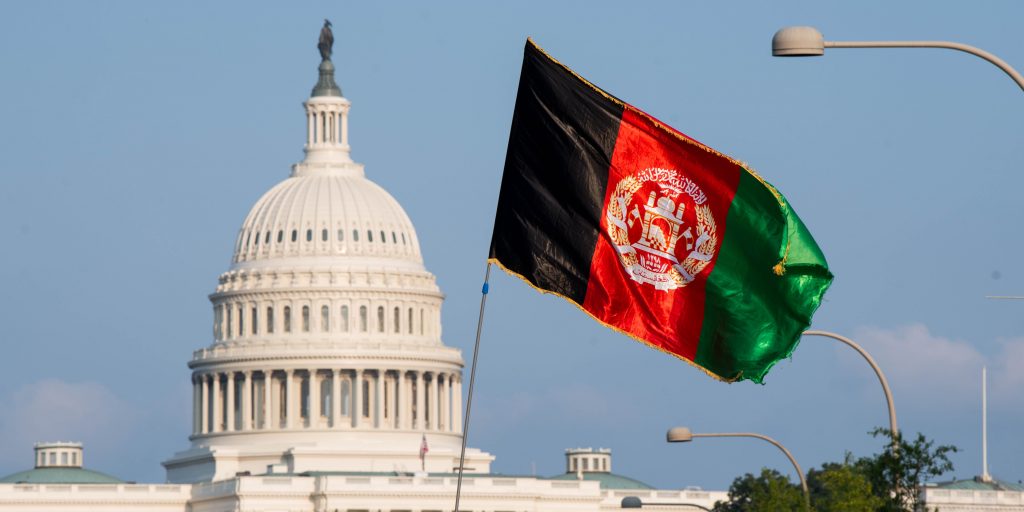- About 77,000 of Afghans who arrived in the US this past year have temporary legal status.
- They don't have a clear pathway to citizenship, leaving them in legal limbo.
- Congress introduced a bill that would create that pathway. Advocates say action is needed now.
Starting a new life in a foreign place is immensely difficult: you must find housing, get a job, apply for health insurance, enroll your children in school, buy a car.
For many Afghans who fled their home country when the Taliban seized power a year ago, the process also involves learning English and navigating American culture.
Khalis Noori has been helping Afghans resettle in the United States. Noori assembled a 30-member all-Afghan team to execute the task, to much success. They have resettled around 1,400 Afghans in Virginia since November, when Lutheran Immigration and Refugee Service, a resettlement group, opened a facility in the area.
Yet that's only one crucial part of the job. The other, major problem is their legal status: Will these Afghans, many of whom served alongside American troops in the 20-year war, soon become undocumented immigrants at risk of deportation?
That question hangs over more than 77,000 Afghans who arrived in the US last summer. They are currently under temporary legal status and can seek permanent residency. But the American immigration system — slow-moving and complex under the best of circumstances — is backlogged. It could take many years, decades possibly, until applications are approved. Even that's not promised, which has thrown Afghan evacuees into legal limbo.
Advocacy groups have been pressuring the federal government for a solution. President Joe Biden in May called on Congress to create a pathway to citizenship for Afghan evacuees. A bipartisan group of lawmakers this month introduced legislation called the Afghan Adjustment Act that would do just that.
Passing the bill would not only provide "peace of mind" for Afghan evacuees, but show them that the United States has kept its word to allies now living on US soil, Noori said.
"If they do this, then history will not forget that," said Noori, himself an Afghan evacuee. "The Afghan people will not forget that."

'A lot of them are in panic mode'
A majority of Afghan evacuees came to the United States on a temporary legal status known as humanitarian parole, which expires after two years. The first year has already passed for some.
"Right now, a lot of them are in panic mode. They know they're coming up on the year-mark," said Megan Flores, executive director at the Immigrant and Refugee Outreach Center, which has helped resettle Afghan evacuees in the Washington, DC, metro area. "They don't have anyone to help them, and we don't have a lot of resources to point them to."
To obtain lawful permanent residency, Afghans who were allies to the US government can apply for a special immigrant visa. Around 74,000 such applications — both from Afghan allies in the US and those still in Afghanistan — have yet to be processed, senior Biden administration officials said last month.
The other route for Afghan evacuees is to apply for asylum. The United States Citizenship and Immigration Services has a backlog of more than 400,000 asylum cases.
"Our asylum system is pretty broken. So they enter this long line of asylum applications that just adds to a stress level that people don't need after what they've been through," said Alicia Wrenn, senior director of resettlement and integration at Hebrew Immigrant Aid Society, a nonprofit that has served about 4,200 Afghan evacuees.
Activists, veterans groups, faith leaders, and refugee and humanitarian organizations have rallied behind the Afghan Adjustment Act, which they say would allow evacuees to change their legal status to permanent residency.
"Unless there's a change in their status, they do not have an automatic pathway to legal, permanent residency or citizenship," said Krish O'Mara Vignarajah, president of LIRS, which has served around 13,500 Afghan evacuees nationwide. "That was not the promise that we made. We made a promise that, when they risk their lives to protect ours, that we would keep them out of harm's way."
The White House has expressed support for Congress' efforts to create a pathway for permanent residency. Proponents of the bill said there's an urgency to protect evacuees now under the Biden administration, fearing a future administration that could be hostile to immigrants.
"Do we believe that this administration would undertake deportation, even if we didn't have the AAA pass? No," Vignarajah said. "Do we believe there's a risk of this being up to the whim of a future administration? Absolutely."
Immigration, in general, is likely to again be a hot topic during the 2024 presidential election, the campaign for which is expected to begin in earnest following November's midterm congressional elections.
Biden, a Democrat, has indicated he will seek a second, four-year term, while the Republican field will largely depend on whether former President Donald Trump decides to run despite his mounting legal troubles.

It's up to Congress to act
Congress has passed similar immigration legislation after times of conflict in Iraq, Vietnam, and Cuba, enabling evacuees from those countries to change their legal status in the United States from temporary to permanent.
Advocates for Afghan allies have been disappointed about the lack of widespread momentum on Capitol Hill. Some said the national attention shifting this year to other domestic and foreign policy matters, such as Russia's war in Ukraine, have resulted in US officials paying Afghans less attention.
Biden initially called for a pathway to permanent residency for Afghan evacuees to be included in an emergency aid package for Ukraine back in May, but Congress excluded it from the bill.
Republicans at the time had raised concerns about the vetting of Afghan evacuees, pointing to a watchdog report that found some gaps in the process. Afghan evacuees had been screened before they entered the US at American air bases in the Middle East and Europe, sometimes more than once.
Shawn VanDiver, a veteran who founded AfghanEvac, a coalition of more than 200 organizations dedicated to helping Afghan allies, called Congress' inaction "the most frustrating thing."
"These folks need our help," VanDiver said of the Afghan evacuees.
But the introduction of the Afghan Adjustment Act last week has renewed hopes that lawmakers might move on the issue. The Senate version currently has five cosponsors, while the House bill has 43. All that's left is for the US to carry through on its promise to its allies, Noori said.
"Afghans worked as interpreters, worked as journalists, worked as human-right activists, women-right activists," Noori said. "They promoted the American way of life somehow in Afghanistan, and they were so proud of these ideologies."
"For all of these reasons, they should not only be rewarded" but taken "out of this legal limbo," he added.
Dit artikel is oorspronkelijk verschenen op z24.nl

